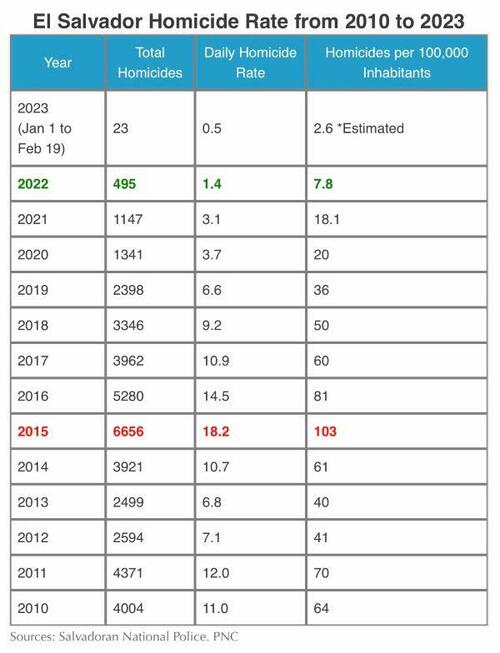How To Cut Your Country's Crime Rate By 97%.

Republic of The Savior
The last time I wrote about El Salvador here, back in 2021, I used the English translation of the country's official name: Republic of the Savior. I used that title, because El Salvador was being seen then as a savoir of Bitcoin: Its President Nayib Bukele had made Bitcoin official tender in the country and announced he was going to use geothermal energy to fuel Bitcoin mining (at the time, there was a lot of concern about fossil fuels being used to power Bitcoin mining).
I’ve just instructed the president of @LaGeoSV (our state-owned geothermal electric company), to put up a plan to offer facilities for #Bitcoin mining with very cheap, 100% clean, 100% renewable, 0 emissions energy from our volcanos 🌋
— Nayib Bukele (@nayibbukele) June 9, 2021
This is going to evolve fast! 🇸🇻 pic.twitter.com/1316DV4YwT
Some Bitcoin maximalists speculated that this would make El Salvador a mecca for blockchain entrepreneurs, but I was skeptical at the time, noting the country's high homicide rate:
The challenge for Bitcoin enthusiasts is that El Salvador is, well, El Salvador. Salvadoran immigrants have struggled in the U.S., as Jason DeParle noted in a dispiriting New York Times article ("Struggling to Rise in Suburbs Where Failing Means Fitting In"). One might hope El Salvador's embrace of Bitcoin will attract talented immigrants to El Salvador, but that hope should be tempered by knowledge that El Salvador has the highest homicide rate in the world.
The astonishing thing though is that President Bukele has apparently solved his country's homicide problem.
A 97% Reduction In El Salvador's Homicide Rate
In 2015, El Salvador had the highest homicide rate in the world: 103 homicides per 100,000 inhabitants. Last year, its rate dropped to 7.8. This year, it's on pace to hit 2.6.
President Bukele's One Weird Trick
Bukele's one weird trick to cut his country's homicide rate by 97% was to round up his criminal class, and put them in giant jails. He shared a video of his country's prison guards packing them in.
Hoy en la madrugada, en un solo operativo, trasladamos a los primeros 2,000 pandilleros al Centro de Confinamiento del Terrorismo (CECOT).
— Nayib Bukele (@nayibbukele) February 24, 2023
Esta será su nueva casa, donde vivirán por décadas, mezclados, sin poder hacerle más daño a la población.
Seguimos…#GuerraContraPandillas pic.twitter.com/9VvsUBvoHC
Here's the English translation of that tweet:
Today at dawn, in a single operation, we transferred the first 2,000 gang members to the Center for the Confinement of Terrorism (CECOT). This will be their new house, where they will live for decades, mixed up, unable to do any more harm to the population. We continue…
Let's hope our leaders can learn something from El Salvador's example.

Comments
Post a Comment